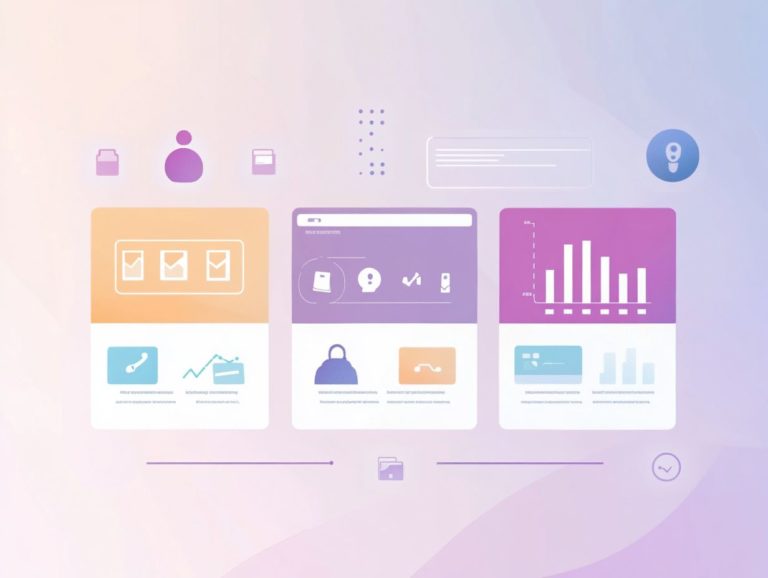How to Ensure Data Quality in CRM?
In today s data-driven landscape, ensuring high data quality in your Customer Relationship Management (CRM) systems is paramount for effective decision-making and fostering strong customer engagement.
This article delves into the essential elements of data quality, covering its definition, significance, and the common challenges organizations encounter.
You ll discover proven strategies and best practices for data collection and management, gain insights into useful tools and technologies, and learn how to measure and enhance data quality over time.
Join us in this exciting journey to ensure your CRM data is accurate, reliable, and ready for action!
Contents
- Key Takeaways:
- Understanding Data Quality in CRM
- Common Data Quality Issues in CRM
- Strategies for Ensuring Data Quality
- Best Practices for Data Collection and Management
- Tools and Technologies for Data Quality Management
- Overview of CRM Systems and Data Quality Tools
- Measuring Data Quality in CRM
- Data Quality Maintenance and Improvement
- Continuous Monitoring and Updating Processes
- Frequently Asked Questions
- What is data quality in CRM?
- Why is data quality important in CRM?
- How can I ensure data quality in CRM?
- What are some common data quality issues in CRM?
- How can I prevent data quality issues in CRM?
- What are some data quality tools for CRM?
Key Takeaways:

Data quality is crucial in CRM as it affects decision-making and customer satisfaction.
Address common data quality issues by identifying and correcting inaccuracies.
Ensure data quality by implementing best practices, utilizing tools and technologies, and continuously monitoring and improving processes.
Understanding Data Quality in CRM
Grasping the intricacies of data quality in CRM systems is essential for any organization striving to enhance customer relationships and make informed business decisions.
High-quality data forms the foundation for your personalized marketing campaigns, optimizes sales opportunities, and guarantees dependable reporting processes.
Conversely, poor-quality data can incur significant financial repercussions and obstruct your decision-making capabilities.
Robust data management practices and effective governance can transform customer insights into actionable strategies.
Leverage advanced automation features to boost data accuracy and encourage user adoption, ultimately resulting in enriched customer experiences and streamlined operations.
Defining Data Quality and its Importance
Data quality refers to how good your data is. It depends on accuracy, completeness, and reliability. This is crucial for effective data management and governance within your CRM systems.
For you as a CRM user, upholding high standards of data quality not only boosts the efficiency of your customer interactions but also cultivates trust in the information you rely on.
When your data is accurate, it genuinely reflects the state of your customer relationships, enabling you to make well-informed decisions.
Similarly, completeness ensures that no essential information slips through the cracks, which can significantly impact how you collect and utilize customer data throughout their journey.
As you strive to deliver personalized experiences, high-quality data becomes the bedrock of successful marketing strategies and customer engagement initiatives, ultimately nurturing loyalty and driving revenue.
Common Data Quality Issues in CRM
Common data quality issues in your CRM system can seriously hinder your organization s capacity to harness customer data for impactful marketing and sales initiatives.
These challenges often arise from data entry errors, isolated data silos, and the inevitable decay of information over time.
Identifying and Addressing Data Inaccuracies
Identifying and addressing data inaccuracies is essential for you to maintain the integrity of customer data in your CRM systems and to ensure that your business decisions are founded on reliable information.
To enhance this process, you can implement systematic data cleaning methods, which involve detecting and correcting errors or inconsistencies in your datasets.
Validation processes are another layer of protection, checking your data against established standards or rules before it even enters your system, further ensuring accuracy.
By conducting regular data audits, you can proactively uncover discrepancies and resolve issues before they escalate into more significant problems.
Audits highlight inaccuracies and provide insights into recurring errors, enabling you to implement corrective measures that can significantly improve your data quality over time.
Strategies for Ensuring Data Quality

Implementing effective strategies for ensuring data quality is crucial for you as an organization aiming to optimize your CRM systems.
By focusing on reliable data management, you can significantly enhance customer experiences and drive meaningful results.
Start implementing these strategies today and watch your customer relationships thrive!
Best Practices for Data Collection and Management
Best practices for data collection and management require you to establish clear data standards and protocols. This ensures that high-quality customer data is captured and maintained efficiently.
These standards are fundamental in guiding how data is recorded, categorized, and reviewed across various systems. Equally important is the emphasis on user adoption. When CRM users fully embrace these strategies, it results in enhanced data integrity and consistency.
By providing detailed training materials, you equip all team members with the skills necessary to utilize the CRM effectively. Together, trained users and standardized data practices can transform your data quality! This powerful combination elevates overall data quality and streamlines processes, enabling your organization to derive actionable insights and make informed decisions.
Tools and Technologies for Data Quality Management
Leveraging the right tools and technologies for data quality management is essential for you as a CRM user. This approach ensures data accuracy and helps generate valuable insights that shape your business decisions effectively.
Overview of CRM Systems and Data Quality Tools
An overview of CRM systems and data quality tools reveals their potential to streamline your data management processes and enhance your data cleaning efforts. By integrating strong automation features, these systems significantly reduce your manual workload while ensuring consistent data entry across various platforms.
With their strong data checking features, they help you identify inconsistencies and inaccuracies, thereby elevating the overall quality of your information. As a result, you can make more informed decisions, strengthen customer relationships, and ultimately drive growth.
The seamless interaction between automated tasks and data governance contributes to a more efficient workflow. This allows your teams to focus on strategic initiatives instead of troubleshooting data discrepancies.
Measuring Data Quality in CRM
Measuring data quality in CRM systems involves utilizing essential metrics and performance indicators that evaluate crucial elements such as data accuracy and completeness. This approach will guide you in enhancing your organization’s data governance efforts.
Key Metrics and Performance Indicators

Key metrics and performance indicators are essential for you in assessing the effectiveness of data quality initiatives within your CRM systems. They provide valuable insights into data accuracy and help identify common data issues.
Among these metrics, the percentage of accurate data entries is a primary indicator of reliability. This enables you to pinpoint discrepancies that could impede operational efficiency.
The completeness of your data, evaluated by the frequency of missing values, is another critical factor that influences how effectively your company can harness its data assets.
Trends in data duplication rates are important; high duplication can severely skew your analysis and decision-making processes.
By closely monitoring these indicators, you can refine your data management strategies. Ensuring that your targeted improvements enhance data quality will ultimately lead to stronger customer relationships.
Data Quality Maintenance and Improvement
Ensuring effective data quality maintenance and improvement requires a commitment to continuous monitoring and regular reviews. By diligently identifying and rectifying discrepancies in your CRM systems, you can elevate the integrity of your data and enhance overall operational efficiency, while also considering how to maintain data privacy in CRM software.
Take action now to enhance your organization s data governance!
Continuous Monitoring and Updating Processes
Continuous monitoring and updating processes are crucial for maintaining data quality. They allow organizations to manage data governance within CRM systems effectively.
Implementing automated alerts for data entry errors helps you quickly identify inaccuracies before they escalate. These alerts not only provide immediate fixes but also present valuable opportunities for improvement, guiding your team to enhance data handling practices.
Cultivating a culture of data accuracy is essential. When everyone understands their role in maintaining data integrity, the entire organization benefits!
Frequently Asked Questions
What is data quality in CRM?
Data quality in CRM means how accurate and complete the information in your CRM system is. It ensures the data used for decision-making is reliable and error-free.
Why is data quality important in CRM?

Data quality is crucial in CRM for several reasons. It helps in making informed decisions, improves customer satisfaction, saves time and resources, and maintains the credibility of the data.
How can I ensure data quality in CRM?
There are several ways to ensure data quality in CRM. Regular data cleansing, implementing data governance policies, training employees on data entry, and using data quality tools are essential strategies.
What are some common data quality issues in CRM?
Common data quality issues in CRM include duplicate records, outdated information, incomplete data, and inconsistencies across different sources. Regular monitoring helps in identifying these issues early.
How can I prevent data quality issues in CRM?
To prevent data quality issues in CRM, establish data quality standards, monitor and clean the data regularly, conduct audits, and implement governance policies.
What are some data quality tools for CRM?
Popular data quality tools for CRM include data profiling software, data cleansing software, data matching software, and data governance tools. These tools can help identify and rectify data quality issues in CRM systems.
Start implementing these strategies today to boost your CRM’s data quality!






